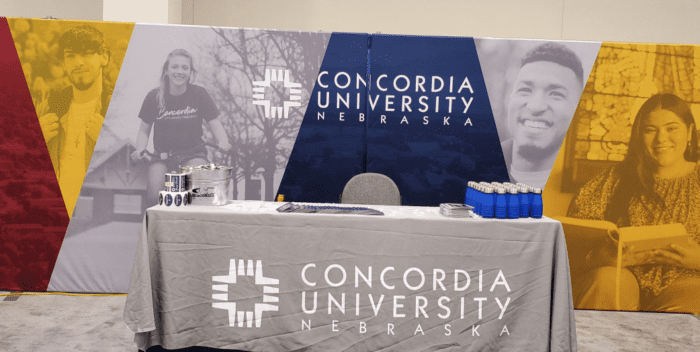LCMS Convention changes university governance
Photo description: CUNE’s display at the LCMS National Convention
Photo credit: Rev. Russ Sommerfeld
Nora Betts
Sower Staff
The 68th Regular Convention of The Lutheran Church—Missouri Synod convened in Milwaukee this summer and voted to make changes in the governance structure for the Concordia universities.
“Overall, this was an overwhelmingly positive convention for Concordia [Nebraska] and the Concordia University System as a whole,” CUNE President Dr. Bernard Bull said in a statement.
The convention, a national event held every three years, passed Resolution 7-04B, which affirmed synodical governance within the Concordia University System through informal and formal visits to
each university.
CUNE will receive one informal visitation from the synod each year and one formal visit every three years. The first formal visit for CUNE will be completed by January 2026 so that a report can be presented at the next church-wide convention in July 2026.
CUNE’s Assistant to the President for Church Engagement Rev. Russ Sommerfeld said the purpose of each informal visit is to “help us think about any improvements we might want to make overall as a university and also in our church work programs so that we really express our Lutheran Christian identity as a university.”
The formal visitation every three years will begin with a self-study of the university followed by a visit by a team put in place by the Concordia University System’s board.
According to Sommerfeld, the visit team will examine many aspects of life at CUNE, “ranging from our church work programs to our other academic programs to our student life to our chapel.”
It also will prepare a report to hold CUNE accountable in relationship to the larger church body as well as to find ways to improve any deficiencies, said Sommerfeld.
Sommerfeld said CUNE may appoint task forces to prepare for the visitations and to complete the self-study.
Each president in the Concordia University System is allowed to offer input on the “Lutheran identity standards and mission outcomes” to which they will be held accountable, according to Sommerfeld. University presidents must provide input by Sept. 1, 2024.
“This resolution will serve in our shared effort to have faithful, flourishing, and collaborating LCMS colleges and universities,” Bull said. “The visitation process included in the resolution is a wonderful means of providing encouragement, accountability, cultivating fidelity and offering opportunities for
improvement to each of your Concordia universities.”
Sommerfeld agreed that CUNE can welcome this new system of governance because it continues the university’s relationship with the synod and allows it to best serve every student through the synodical values.
“For us here at Concordia Nebraska, we already have a very strong relationship with the church body and we’re not at all averse to this process,” Sommerfeld said. “We’re glad to be in biblical alignment with our church body because we feel that we have, as a Lutheran institution, a lot to offer to our own Lutheran students but also to Christians of other backgrounds, too, as well as people who come to us who aren’t Christian.”
Resolution 7-05A, also passed at the convention, standardized the ways that members of the universities’
Boards of Regents can be appointed. Regent members elected by the synod and its districts may appoint four to eight non-elected members, with a maximum of 18 board members. Members are often appointed to add specific expertise to the board that elected members cannot provide. Board members who are appointed instead of elected can no longer “vote on the appointment of others or the reappointment of themselves,” said Sommerfeld.
The LCMS convention included an exhibit event where delegates could mingle and visit stations promoting each university. Sommerfeld said the event was especially enjoyable because the six featured universities worked as a team to promote what makes each Concordia unique.
“We offer some of the same things, but we offer a lot of things that are different from one another,” said Sommerfeld. “If someone would come up to Concordia St. Paul and say, ‘Do you have an agricultural program?’ they’d say, ‘No, we don’t… but Concordia Nebraska does. They’re right down there.’ Likewise, CUNE could recommend programs at other Concordias.”
The other Concordia universities with displays were Concordia University Chicago, Concordia University Ann Arbor, Concordia University Wisconsin, Concordia University St. Paul and Concordia University Irvine.
Concordia University Texas did not participate in the exhibit due to its recent rejection of synod governance.

Dr. Lorinda Sankey talks to youth about
CUNE at the LCMS National Convention.
Photo credit: Rev. Russ Sommerfeld
“One of our universities right now, Concordia Texas, wants to govern themselves rather than having the oversight of the Lutheran Church–Missouri Synod,” Sommerfeld said. “That was debated in a respectful manner. The convention called upon CTX president and regents to repent, receive forgiveness, and reconcile. President Bull spoke eloquently on the convention floor, inviting CTX back to the table with other Concordias.”
Also representing CUNE were President Bernard Bull; Dennis Meyer, board of regents chair; Dr. Lorinda
Sankey, dean of the College of Education; Rev. Dr. Paul Holtorf, professor of theology; Dr. Joseph Herl, faculty representative and professor of music; and Jennifer Furr, senior director of alumni and university relations.














